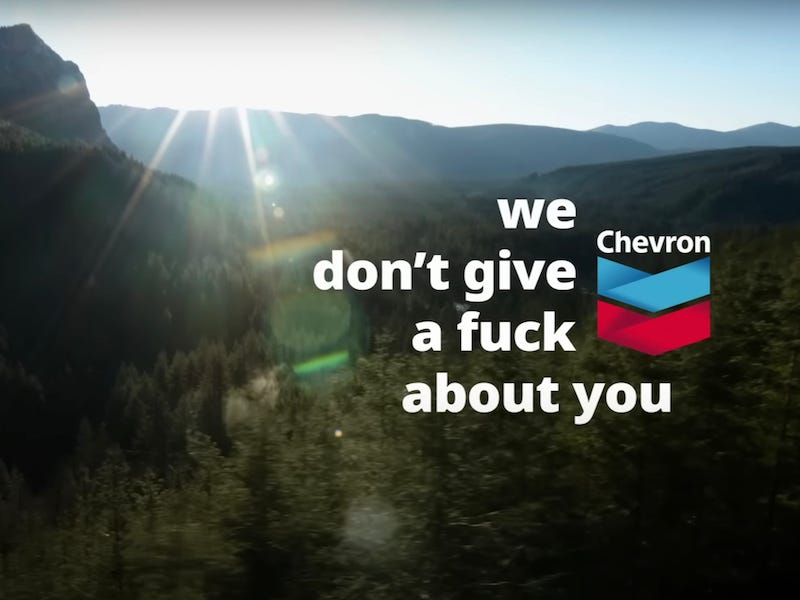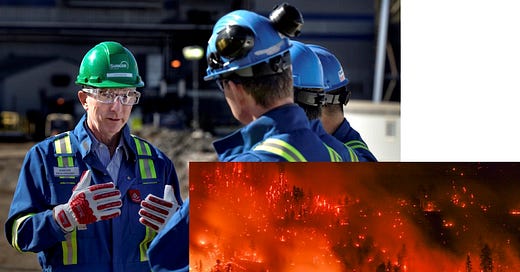Would You Buy a Used Energy Strategy from This Guy?
Suncor CEO Rich Kruger wants to double down on oil sands production while Canada burns and the world bakes. Investors are thrilled. What planet do they think they live on?
It’s 2023. Huge swaths of Canada are on fire. Much of the world is baking, burning, drowning, or starving. And the new CEO of Calgary-based Suncor Energy wants his company to go all-in on its oil sands operations after it sold off all its wind and solar projects.
“We have a bit of a disproportionate emphasis on the longer-term energy transition,” Rich Kruger told analysts earlier this week. “Today, we win by creating value through our large integrated asset base underpinned by oil sands.”
If you live downstream or downwind of Suncor’s operations, or if you’re like all of us and depend on the atmospheric systems the company is doing its best to broil—what could possibly go wrong?
And if you’re an investor who expects this company to survive its own business strategy as governments tackle the climate emergency and the wider investment picture shifts—or even if you expect your other investments to deliver as advertised despite mounting climate chaos—what in the world are you thinking?
At least the new Suncor CEO is performing as expected, however unpalatable and dangerous that performance might be.
Over a 39-year career, Kruger rose to the top job at ExxonMobil’s Canadian branch plant, Imperial Oil, before coming out of retirement to take the helm at Suncor. So he comes out of a company culture that has been built around denying and suppressing climate science since the 1970s, spending lavishly to fund the climate denial that has poisoned our politics as surely as it has helped bring us to this climate crisis point.
You would scarcely know that this was the same Canadian fossil company that spent years spinning itself as a master of the energy transition, spending loudly on the solar and wind projects, and winning a basketful of plaudits [pdf] for its corporate performance. Until it dumped the clean investments and dropped the pretence.
Someone Else’s Problem
It isn’t unusual for Canada’s fossil industry to ignore its “externalities”—the antiseptic language that economists use for company execs who managed to graduate kindergarten without learning to clean up after themselves when they’d finished playing. Now they’re all grown up, and they’ve built an industry that thinks nothing of leaving Alberta with as much as $260 billion in abandoned oil and gas wells.
Or of loading up the atmosphere with nearly 200 million tonnes of climate pollution per year, not counting the astonishing 290 megatonnes unleashed by a record wildfire year in Canada by the end of July, some proportion of which is attributable back to Suncor’s operations.
Or of dumping massive quantities of oil sands mine waste into surrounding waterways, as Suncor did in April with a six-million-litre release of high-silt water into the Athabasca River. The incident pointed to “a systemic problem with the management and structural integrity of tailings ponds across the entire region, and a regulator that refuses to regulate,” Athabasca Chipewyan First Nation Chief Allan Adam said at the time.
Now Kruger is doing us all the courtesy of at least saying it out loud: we’re here, our emissions record is clear, and frankly, everyone, we don’t give a damn.
‘As Much Money as Possible’
"I consider myself to be reasonably decisive and very competitive," and "I play to win,” Kruger told analysts in May, a month after taking over the company. “We are in the business to make money and as much of it as possible, and everybody starting with me needs to see how they do that.”
For better and for worse, that’s the language investors expect to hear from any company. But still with the theme of things we should have learned in kindergarten, this Sesame Street analysts’ call was not brought to you by the letters “E”, “S”, and “G”. Not even rhetorically.
“He's just saying the quiet part out loud now,” writes veteran climate policy analyst Dan Woynillowicz. “Reminder: Hoping fossil fuel giants will see the light on climate hasn’t worked.”
“I'm glad this man is not my uncle,” adds Ottawa climate campaigner Angela Keller-Herzog.
Meanwhile, Suncor was on the move, closing a “blockbuster”, $5.5-billion deal to buy up TotalÉnergies’ oil sands operations and announcing a 20% cut in its work force in the name of safety and efficiency. In June, Kruger signalled another 1,500 job cuts by the end of the year.
But, hey, not to worry. While Suncor’s latest Climate Report [pdf] shows emissions from its operations growing slowly but steadily to nearly 35 million tonnes of carbon dioxide equivalent (CO2e) in 2022, the company is planning on a 10-megatonne reduction by 2030, SustainableBiz reports. They say they’ll wrangle the cuts from the Scope 3 emissions that account for about 80% of the carbon in a barrel of oil.
It’s good of Suncor to acknowledge the emissions that occur after their product is shipped to its customers and used as directed. But don’t imagine that the 10-megatonne reduction—if they actually get it done—will come out of their in-house operations.
Those eventual, quite likely mythical emission cuts will largely depend on the carbon capture and storage (CCS) technologies that Suncor has been touting as a member of the Pathways Alliance, whose six members account for 95% of the country’s oil sands production. As The Weekender reported last week, Pathways members have flatly refused to support a 2030 cap on Canada’s oil and gas emissions and made it clear they won’t invest their recent obscene, record profits in the CCS technologies they say they want—not without lavish taxpayer support.
Behaving Badly in Polite Company
Suncor’s behaviour is beyond offensive in the week when Enterprise, Northwest Territories burned to the ground, about 65% of the population of the NWT has been evacuated, and people in West Kelowna are fleeing for their lives after the McDougall Creek wildfire jumped Okanagan Lake. But they’re just one of a parade of fossil companies that have been abandoning their token, “largely meaningless” commitments to clean energy and decarbonization.
The industry only gets away with it because it’s still okay to pretend in polite company that anyone can be serious about getting the climate emergency under control without rapidly phasing down extraction of oil, gas, and coal. Fossil businesses like Suncor spend millions on PR. Climate hawks object. The public gets confused. Financial institutions keep on pouring money into new oil and gas projects. And the vilification these massive climate polluters so richly deserve (and some of them have been expecting) never happens in the circles of influence they inhabit. Not among the institutional investors that hold 65% of Suncor’s stock.
But finally, the tone is beginning to change.
Kruger’s moves this week “will please some investors, who would like to wring as much money as possible from these fossil fuel assets before they become stranded,” writes Corporate Knights founder and publisher Toby Heaps. But “with Big Oil incumbents bailing on clean energy, it will be up to other sectors and entrepreneurs to accelerate the energy transition and reap the rewards of leading the low-carbon economy, one that’s already rivalling—and will soon dwarf—fossil fuels.”
So “let’s cheer them on and let’s stop wasting time by giving Big Oil a seat at the tables where we make important decisions about our future,” Heaps adds, beginning with this year’s COP 28 climate negotiations in Dubai. “It’s bad enough that this year’s summit is being chaired by an oil company executive. Let’s at least keep the rest of the dinosaurs out.”
Mitchell Beer traces his background in renewable energy and energy efficiency back to 1977, in climate change to 1997. Now he and the rest of the Energy Mix team scan 1,200 news headlines a week to pull together The Energy Mix, The Energy Mix Weekender, and our newest weekly e-digest, Cities & Communities.
You can also bookmark our website for the latest news throughout the week.
Video of the Week

Enterprise, NWT Burns to the Ground as Wildfires Ravage Northern Communities
Montreal Adds Nine More Car-Free Streets after ‘Mind Blowing’ Success
Canada’s New Clean Power Regs Allow Gas Plants, Mandate Deep Emission Cuts
Greenbelt Land Grab Wasn’t About Affordable Housing, ‘Unprecedented’ AG Report Shows
Montana Judge Backs Climate Youth in ‘Sweeping Constitutional Win’
Fossil Emissions Deliver ‘Nature Hike Through Book of Revelation’: Gore
‘Turbocharged’ Renewables Transition ‘Moving Faster than People Think’
Mainstream Economists Underplay Climate Risks
NYC Pilot Puts EV Chargers Where Many Residents Park—On the Streets
Alberta risks losing billions in renewable energy investments with moratorium, companies say (Globe and Mail)
B.C.'s most vulnerable still unprotected from extreme heat after 2022 review, advocate says (Canadian Broadcasting Corporation)
Data Update: Shut Down 60% of Existing Fossil Fuel Extraction to Keep 1.5°C in Reach (Oil Change International)
Fossil fuel firms move to dismiss climate lawsuit in Hawai’i as Maui faces wildfires (The Guardian)
Montreal-based dcbel raises US$50-million for bidirectional EV charging (Globe and Mail)
U.S. virtual power plants expected to proliferate as reliability needs rise with increasing renewables (Utility Dive)
OSFI must provide more guidance on financed emissions reporting at the big banks (Investors for Paris Compliance)
GFANZ alliance quietly creates ‘observer category’ for non-members (Responsible Investor)
Ontario First Nations leaders call for housing minister, chief of staff to resign over Greenbelt controversy (Canadian Broadcasting Corporation)
Insiders say Doug Ford saved staffer blamed in Greenbelt scandal — despite advice to let him go (Toronto Star)
How New York Plans to Regulate E-Bikes in the Wake of Deadly Fires (New York Times)
As world’s largest EV battery manufacturing site takes shape, historic Glendale hopes to retain small town identity (Hoptown Chronicle)








Carolyn (and anyone thinking along similar lines), thanks so much for asking -- and yes, feel free to block and copy if that's the only way to amplify our material when you want to. A couple of suggestions:
* Do try to share the links first, as you normally would.
* If that doesn't work, I would suggest sharing the first two or three or four paragraphs in your private post (or just the lead paragraph on TwitterX), then embedding a link for anyone who wants to read the whole post. That will make for a much more inviting, less daunting social media post for anyone who wants to see it!
Because FB and X no longer allow us to share links to items we want to promote, may I do a copy and paste with credit to you on my FB page? I do not want to breach copywrite laws but the way this weekender is phrased says it all. We are caught in the dilemma of requiring fossil fuels to power the aircraft fighting the forest fires, and the vehicles required to move people away from harm as evacuation orders are made, that I do not know how we will ever in this epoc avoid requiring fossil fuels. I suspect we are closer to extinction than we appreciate, but we still need to bend our minds around a return to sailing ships and horse-drawn carriages if some portion of humanity is to survive.